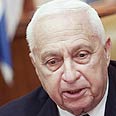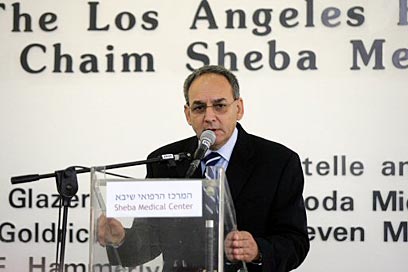
Sharon transferred to rehab
Five months after suffering a debilitating stroke, former prime minister Ariel Sharon transferred to rehabilitation unit at Sheba Medical Center in Tel Hashomer. Purposes of rehabilitation treatment are to get Sharon breathing on his own and to try to return him to consciousness, hospital CEO says
Former Prime Minister Ariel Sharon was transferred from the Hadassah Hospital in Ein Kerem to the Sheba Medical Center in Tel Hashomer Sunday.
He was transported in an intensive care ambulance escorted by a security convoy and under the supervision of a Hadassah doctor. The former PM was moved to Sheba’s Respiratory Rehabilitation Ward.
The former prime minister's transfer to Tel Hashomer was carried out under tight security, with the Shin Bet taking efforts to safeguard his privacy.
Head of the Sheba Medical Center, Prof. Zeev Rothstein, said that Sharon is currently in his bed at the Respiratory Rehabilitation Ward.

Policemen escorting Sharon's ambulance (Photo: Reuters)
Sharon’s hospital room looks like a “mini intensive care,” his doctors described. Since early in the morning, police and security officers filled the entryway and hallways of the ward. Sharon will be attended by a personal nurse around the clock.
Professor Rothstein said the purposes of the rehabilitation treatment were to get Sharon breathing on his own and to try to return him to consciousness. “We have a strategy drawn out for how to treat him. At his age and in his condition, complications are common, and our aim is to try to stabilize him and avoid complications,” Rothstein said. Doctors at Sheba have set a timetable of a few months to achieving those goals.

Prof. Rotstein in briefing to press (Photo: AFP)
“Experts say that the chances of achieving the goals are slim, but we have faith and we will provide the maximum treatment in an effort to get results,” Rothstein said.
He admitted that as time goes by, the likelihood of regaining consciousness after a debilitating stroke is reduced.
Respiratory rehabilitation
Sharon has been unconscious since he had a severe stroke on January 4, 2006, and is being kept alive on life support in hospital. He is expected to undergo a series of processes intended to strengthen his respiratory system in an effort to wean him from dependency on respirators, either partially or fully.
Doctors at Sheba will put Sharon on therapy to strengthen his respiratory system and gradually lessen his dependence on a life-support system that has kept him alive.
The respiratory rehabilitation ward has special treatment programs for patients suffering from head injuries, via various methods including stimulation using sound, light and touch. Patients are nourished with special nutrition programs aimed at strengthening muscles and are prescribed special medications to reduce respiratory stress and increase susceptibility to treatment.
The rehabilitation unit at Sheba has an impressive record with 80 percent of stroke patients successfully disconnected from live-support machines and made able to breathe independently. Should Sharon be able to breathe unaided, he will be put on an advanced therapeutic program for further rehabilitation.
However, despite sophisticated treatment, some patients cannot be weaned off respirators.
Respiratory rehabilitation is a relatively new branch of the rehabilitation field, and Sheba’s department, headed by Dr. Arieh Vilner, is the only one of its type in the country. At present a long list of patients awaits entry into the ward, which offers only 18 beds. Each room generally holds two patients, but Sharon is expected to have a private room. Sharon was treated at Sheba in the past, and his personal doctors, Prof. Boleslav Goldman and Dr. Shlomo Segev, are among the medical center’s staff.










